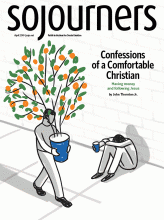STORIES ARE more than mere entertainment: They rest at the heart of who we are. They shape our understanding of the world and how we choose to live in it, both individually and collectively. They can sever us from one another or call us into deeper communion. This is the message at the center of two new books by Gareth Higgins (a Sojourners columnist) and Brian D. McLaren (a Sojourners contributing editor).
In The Seventh Story: Us, Them, and the End of Violence, Higgins and McLaren suggest that the violence and division that is part of our past and present are neither inevitable nor coincidental. They’re part and parcel of the stories we live by. The authors highlight six story types that are particularly pernicious and all too common: stories of domination, revenge, escapist isolationism, scapegoating, acquisition, and victimization.
Drawing on what theologian Walter Wink calls “the myth of redemptive violence,” Higgins looks at the role these story types play in justifying and perpetuating violence. He reminds us that, as was the case in his native Ireland, it is the work of peace and reconciliation—not more violence—that is truly redemptive.
Read the Full Article

